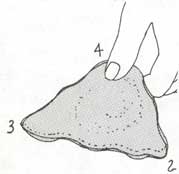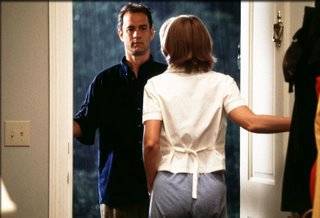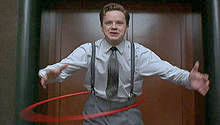 It seems every culture has its carb-based foundation-food, usually in the form of a flat cake or dumpling: tortillas and samosas, frybread and potstickers, hotcakes and crepes, gnocchi and kreplach, pierogi and spaetzle. Just typing them out makes me simultaneously hungry and full. They're simple, familiar, and easy--depending on who's doing the cooking in your house, of course, but you know what I mean. And cinema is full of movies like that, ones you could watch every week, old reliables always welcome. The genre doesn't matter, nor the country of origin nor year released. For me, it's The Maltese Falcon and Forrest Gump, Glengarry Glen Ross and White Heat, Alien and Diner, anything by the Coen Brothers or Hitchcock, Scorsese or Felinni, Kubrick or Lang. I can tuck 'em in over and over, good eatin' every time.
It seems every culture has its carb-based foundation-food, usually in the form of a flat cake or dumpling: tortillas and samosas, frybread and potstickers, hotcakes and crepes, gnocchi and kreplach, pierogi and spaetzle. Just typing them out makes me simultaneously hungry and full. They're simple, familiar, and easy--depending on who's doing the cooking in your house, of course, but you know what I mean. And cinema is full of movies like that, ones you could watch every week, old reliables always welcome. The genre doesn't matter, nor the country of origin nor year released. For me, it's The Maltese Falcon and Forrest Gump, Glengarry Glen Ross and White Heat, Alien and Diner, anything by the Coen Brothers or Hitchcock, Scorsese or Felinni, Kubrick or Lang. I can tuck 'em in over and over, good eatin' every time.My wife has her own version of this: The Fifth Element and The Lord of the Rings, Fried Green Tomatoes and As Good as It Gets, Star Trek: First Contact and anything British, from the Age of Enlightenment, on through the general neighborhood of the Sepoy Rebellion, and stopping somewhere in the tree-dappled vicinity of Howard's End. I share some of her comfort movies--except a more recent one, Cast Away (2000). Twice was nice, three times OK. But it didn't seem to stick to my ribs; instead, it--oh, I don't know; I'm already beginning to feel trapped by this culinary analogy--skip it; I won't even make the attempt. Let's put it this way: I didn't want it on the repeat-viewing queue. From my first viewing, I insisted Cast Away would've been a better film if it had ended at the moment of Chuck Noland's rescue, with his hand raised into the frame, the ship gliding by, the alarms sounding. I felt the final act was simply a protracted epilogue that diminished the mythic power the movie had achieved in its long silence on the island, and Hanks' minimalist expressiveness. I still think his face works as hard in Cast Away as it ever will, but I'd always griped about the return, the loose ends tied up, the Gump-like ending, Noland's face staring, while a feather is pursued. Mighty labors--or labored.
 And so of course, what happens: I come home from work, and my wife and two of my children are watching it. I walk in just as he loses Wilson on the open sea, and so the movie I get is practically all epilogue. But a funny thing happened: I found myself deeply moved by it, breathless in dismay. In his farewell to his wife, Chuck confronts death without paradise. He sees everything he loves taken from him, with nothing in its place. He remains as still as he can, stiff in the presence of a snake that is going to bite him--but it doesn't matter: He's already dead, and the only "afterlife" he's given is a brief parade of what he has lost, a futile embrace, and then the dark.
And so of course, what happens: I come home from work, and my wife and two of my children are watching it. I walk in just as he loses Wilson on the open sea, and so the movie I get is practically all epilogue. But a funny thing happened: I found myself deeply moved by it, breathless in dismay. In his farewell to his wife, Chuck confronts death without paradise. He sees everything he loves taken from him, with nothing in its place. He remains as still as he can, stiff in the presence of a snake that is going to bite him--but it doesn't matter: He's already dead, and the only "afterlife" he's given is a brief parade of what he has lost, a futile embrace, and then the dark.It scared me, that scene; and I realized that, in the final moment, in which he delivers the package and stands--as we all know, ready to follow the beautiful redhead--Cast Away grants a reprieve and becomes a movie once more, blessedly fictional, easy as a stack of flapjacks. But for one moment--at least today, seeing it divorced from the rest of the movie--Cast Away's epilogue made my heart stop, and asked it to contemplate the loss of everything it yearned for--specifically, the one I love, who for her part was calmly watching it for the umpteenth time, proud to say she was the only one who, albeit squinting, watched him ice-skate his tooth out. Ah, a movie moment, the lucky woman, and she wolfed it down. But the Cast Away I saw, twenty minutes long, told me it was all going to go, and I was going to have to take it. This will happen one day, and paradise has nothing to do with it because, as Socrates noted, you don't know if you're going to get it until you do. And as one's life moves, knowing only life, not knowing is simply not good enough. All the faith in the world--at least, all the faith I have--does not lessen the depth and dark of that hole into which--not you, but everything you love--must drop.
 As Tom Waits sings, "Even Jesus wanted just a little more time / As He was walking Spanish down the hall." Cast Away, for a few minutes there, takes away that time, and gives me nothing but what must be. I think it's safe to say that this is the opposite of comfort food. Cripes; I really need to get myself in front of The Hudsucker Proxy or Coppola's Dracula or something; any silly dumpling will do.
As Tom Waits sings, "Even Jesus wanted just a little more time / As He was walking Spanish down the hall." Cast Away, for a few minutes there, takes away that time, and gives me nothing but what must be. I think it's safe to say that this is the opposite of comfort food. Cripes; I really need to get myself in front of The Hudsucker Proxy or Coppola's Dracula or something; any silly dumpling will do.
1 comment:
Thank you, that was a wonderful observation on the emotional truths of the final act of Cast Away. My original impression of that movie was the same as yours: the too-neat final act washed away the impact of the survival story. But after reading your essay, I'm curious to see it again with a more open mind. I suppose I'll have to wait for it to show up on cable, though, as my Netflix queue is really too long right now as it is.
Post a Comment